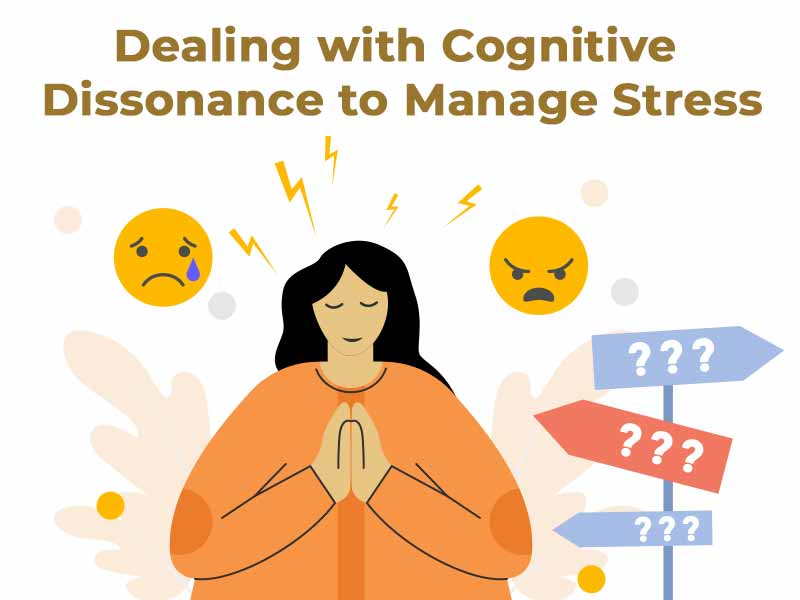You're living your life, confident in your beliefs and values, when suddenly- a nagging discomfort creeps in. A doubt. Do your actions really match your precious value systems? Are they maybe a little out-of-sync? That's cognitive dissonance. It's a mental tug-of-war that can leave you feeling uneasy and stressed.
Now, here's a little nugget of history: Back in 1957, a psychologist named Leon Festinger gave a name to this intriguing concept. So, if you're curious about the fascinating world of the mind and want to explore why we sometimes feel this inner conflict, buckle up! We're about to dive into the intriguing realm of cognitive dissonance.
Some common examples of cognitive dissonance in our daily life are:

- You want to be healthy, but you don't exercise regularly or eat healthy. In the end, you just keep feeling guilty.
- You know that smoking is harmful to your health, but you just can’t give it up; with every cigarette, you tell yourself it will be the last time and that it is only because of so much stress, but you still feel disgusted with yourself.
- You want to build your savings but cannot resist splurging on the latest lip-gloss you saw that influencer talking about or grabbing that cute top. After you shop, you then start worrying about your future financial security.
- You have an important exam coming up and you need to study, but you spend your free time watching YouTube or scrolling on Instagram for “tips” and by the time you look up, it’s past midnight. You panic at the thought of not passing your exam, which makes your irritable and moody.
Leon Festinger, the psychology pioneer, believed that each of us is driven to steer clear of or find resolutions to the discomfort stirred up by cognitive dissonance. It's a bit like our minds' built-in defence mechanism against this internal conflict. Fascinating, right?
Now, how do you know if you're amid a cognitive dissonance battle? Keep an eye out for these telltale signs:
- You’re defensive about your choices.
- You make sure to avoid certain conversations or topics.
- You’re suddenly extremely angry, irritable, or frustrated.
- You feel jealous or bitter about other people’s success or feel compelled to explain why it hasn’t happened for you.
- You spend a lot of time or energy justifying your actions, even when no one’s questioning them.
- People that know you well are surprised by your statements or behaviour.
- You try to convince others that your way of thinking is the right one.
- You downplay the risks of your potentially dangerous or unhealthy behaviour.
- You experience feelings of discomfort when talking about yourself or with someone who disagrees with you.
- You react to gentle, constructive, criticism with irrational anger.

Reducing cognitive dissonance and actively making changes to your behaviour can be a transformative journey. Here's how you can navigate it with self-awareness:
- Recognize Your Feelings: Imagine you're on a mission to shed some pounds, diligently sticking to a strict diet. Then, a friend invites you to lunch, and the irresistible aroma of fries tempts you. Your friend playfully remarks about your diet, and you feel irritated by their teasing.
- Embrace the Feeling: Instead of immediately getting defensive or annoyed with your friend, take a moment to acknowledge your own disappointment with yourself. It's okay to admit that you're feeling conflicted.
- Commit to Change: Now that you've identified your true desire to maintain a healthy diet, resist the urge to rationalize your decision ("I barely ate breakfast" or "I'll skip dinner"). Instead, opt for a proactive approach. Request that the fries be packed up and consider sharing them with your friend or colleagues at the office. This not only aligns with your health goals but also diffuses any potential tension with your friend.
- By becoming more aware of your triggers, emotions, and taking constructive steps like these, you can effectively reduce cognitive dissonance and pave the way for positive behaviour change.
While some changes may appear straightforward, cognitive dissonance is more often- subtle and elusive, and its roots may be deeply buried in our subconscious. In these cases, seeking guidance from a certified professional is the best choice.
A trained therapist or counsellor can assist you in developing self-awareness, uncovering the underlying causes of your cognitive dissonance, and providing strategies to address and resolve these conflicts effectively. It's a valuable step toward personal growth and achieving lasting positive changes in your life.
EKAM’s range of aromatherapy products can help you connect with your inner-self and aid you in your daily journaling, yoga, and meditation practice to help increase self-awareness. Our Wellness Blends are made from pure essential oils and blended for therapeutic benefits.
USE code COG10 to get 10% off on your next order, minimum cart value of ₹999.





